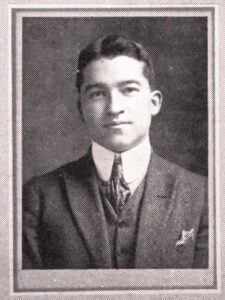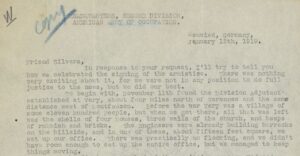November 11, 2018 is Veterans Day and marks the 100th anniversary of the Armistice that ended World War I. To commemorate this centennial, What Exit? will be featuring letters from Special Collections and University Archives’ Records of the Rutgers College War Service Bureau. This collection features letters from Rutgers students and alumni who served in the First World War, describing their experiences serving in the United States and overseas. Each day between November 1 and 11, Voices of the Armistice posts will share what these Rutgers students from 100 years ago had to say about the moment when peace was declared.

J. H. [Jonathan Henry] Huntington (class of 1916) was serving with the American Expeditionary Forces in France when the Armistice was signed. He described his division’s response as mostly quiet, with brief—but emphatic—celebration.
“There was nothing very exciting about it, for we were not in any position to do full justice to the news, but we did our best.
To begin with, November 11th found the Division Adjutant established at Very, about four miles north of Varennes and the same distance west of Montfaucon. Before the war Very was a village of some eleven hundred people, but when we got there, all that was left was the shells of four houses, three walls of the church, and heaps of rubbish and bricks . . .
The first news we had of the armistice came on Wednesday evening, when the Corps phoned that Germany was sending envoys to discuss the terms of an armistice. The news didn’t get around until the next day, but about four o’clock Thursday afternoon things broke loose. Pistols, rifles, flares and pyrotechnics were set off, and the cheering was tremendous. The celebration lasted about an hour.
From that time until we received orders over the phone that the armistice had been signed at five o’clock Monday morning, and the hostilities would cease at eleven, there was no demonstration at all. In fact, the news was received very quietly where we were, and work went on as usual.”

After the war Huntington worked in life insurance. He died in 1974.
The Rutgers War Service Bureau was formed in 1917 as a way to keep Rutgers men serving in the war in touch with Rutgers and each other. It was headed by Earl Reed Silvers (class of 1913), who was assistant to Rutgers president William Henry Steele Demarest. Thanks to a grant from the New Jersey Historical Commission, the letters are now available online.
Be sure to visit What Exit? between November 1 and 11 for new stories and follow highlights on Special Collections and University Archives’ Facebook and Twitter.
(With assistance from Tara Maharjan. Photo of Huntington from the Scarlet Letter 1917 Yearbook.)